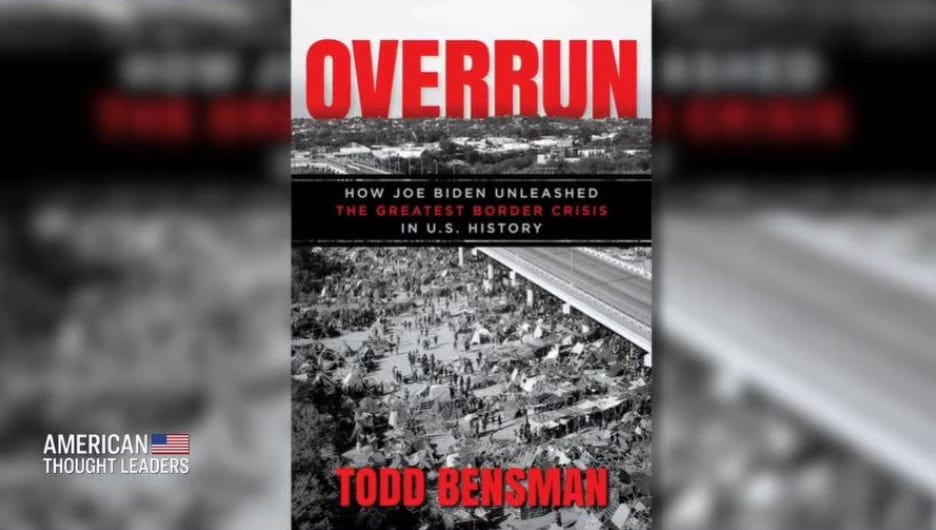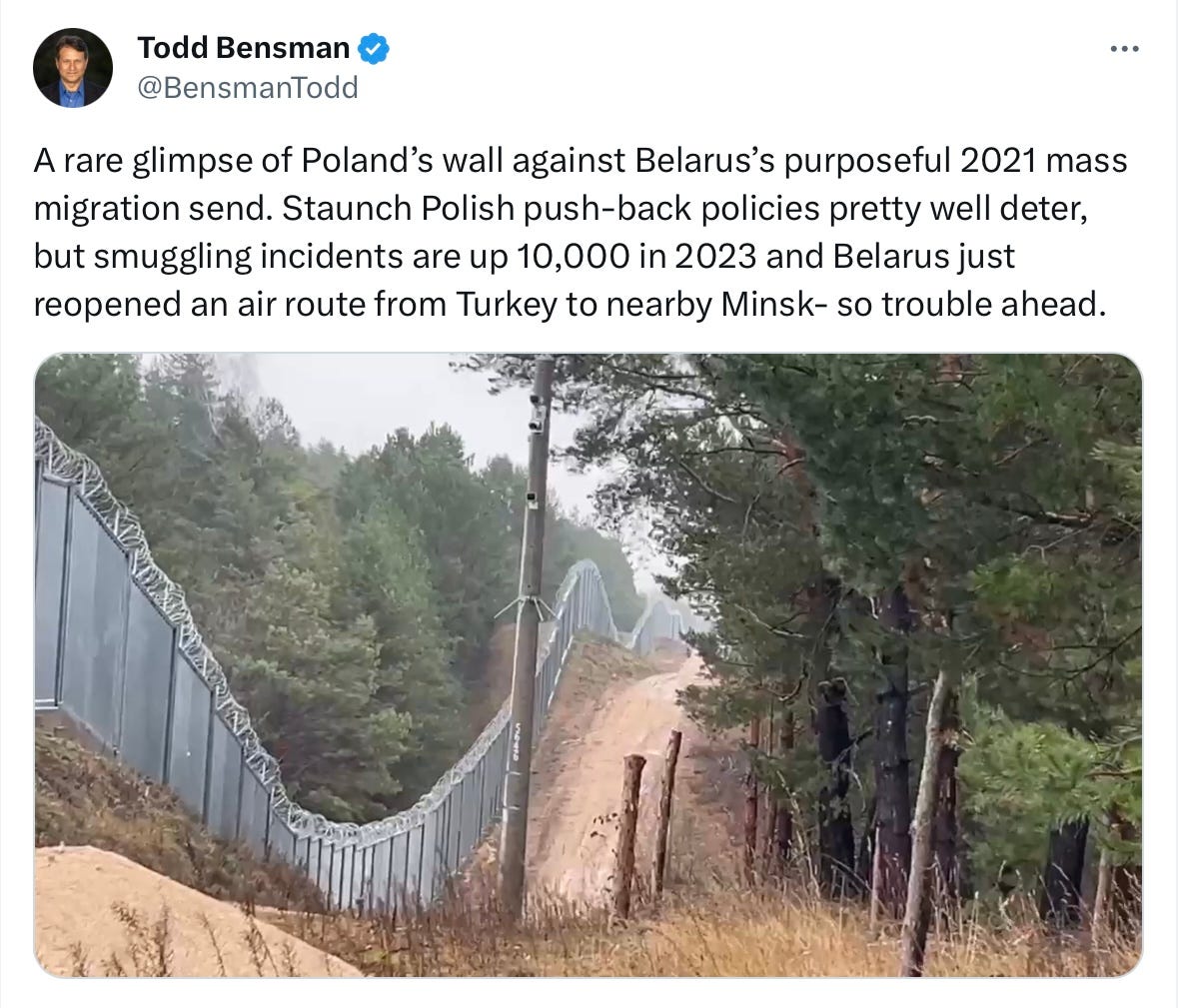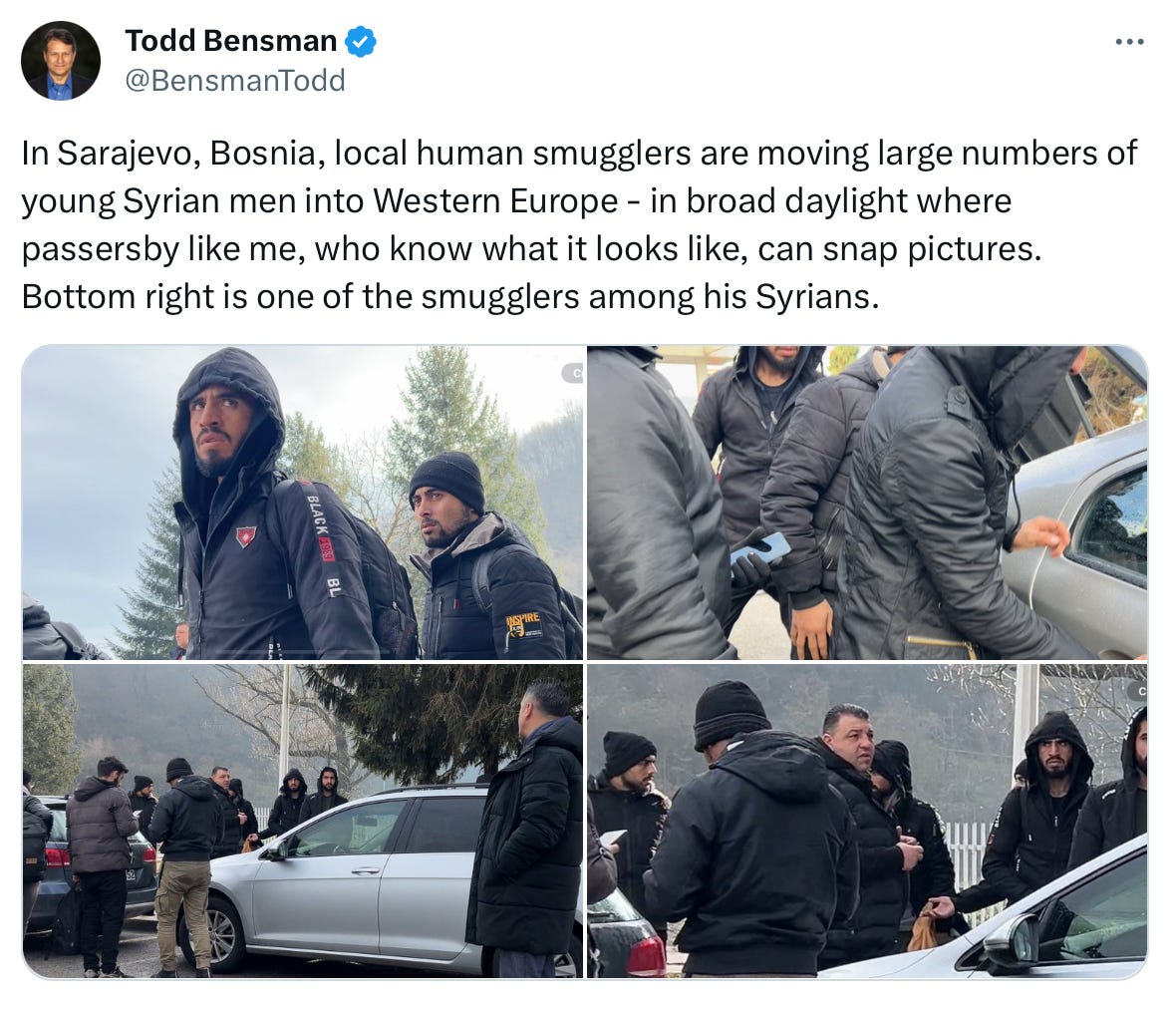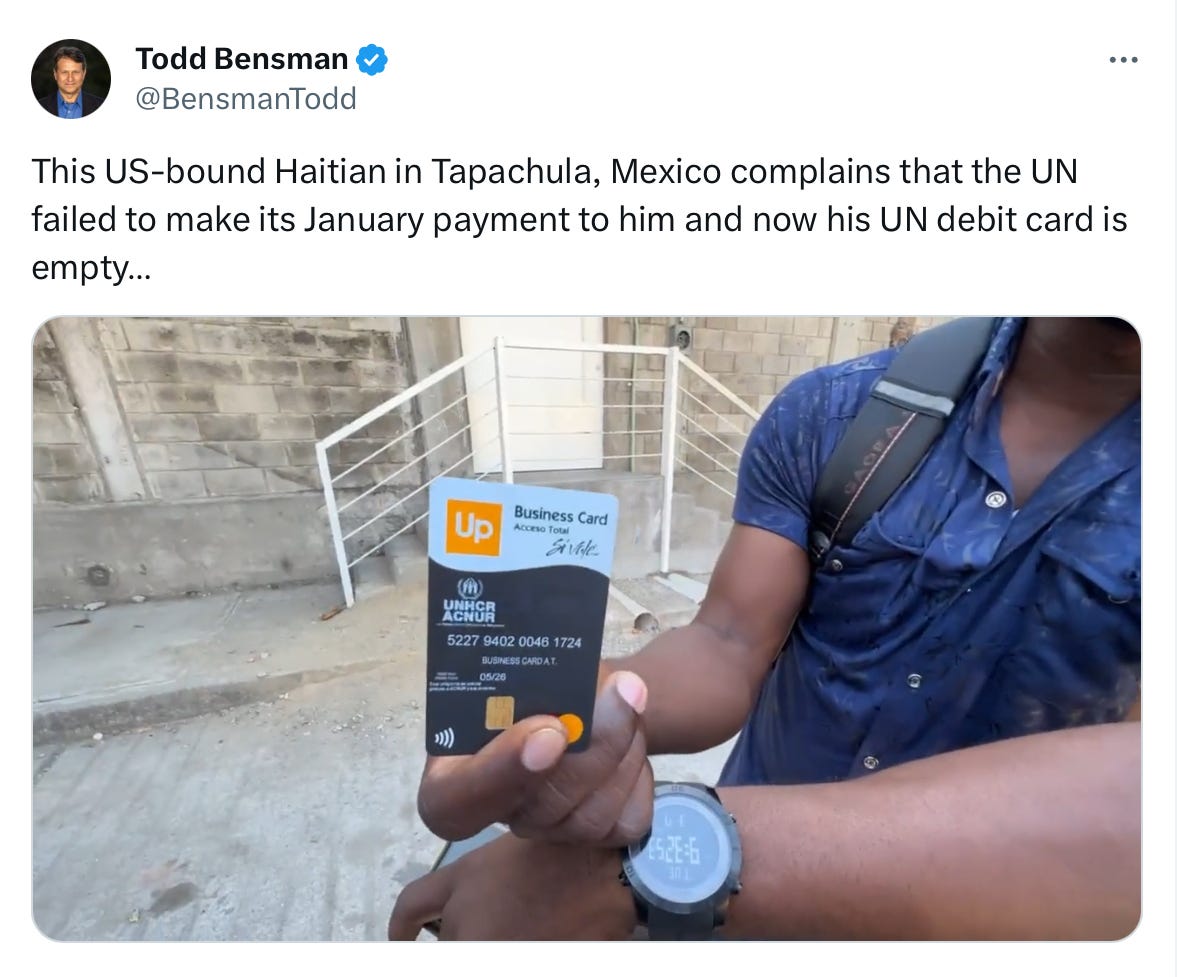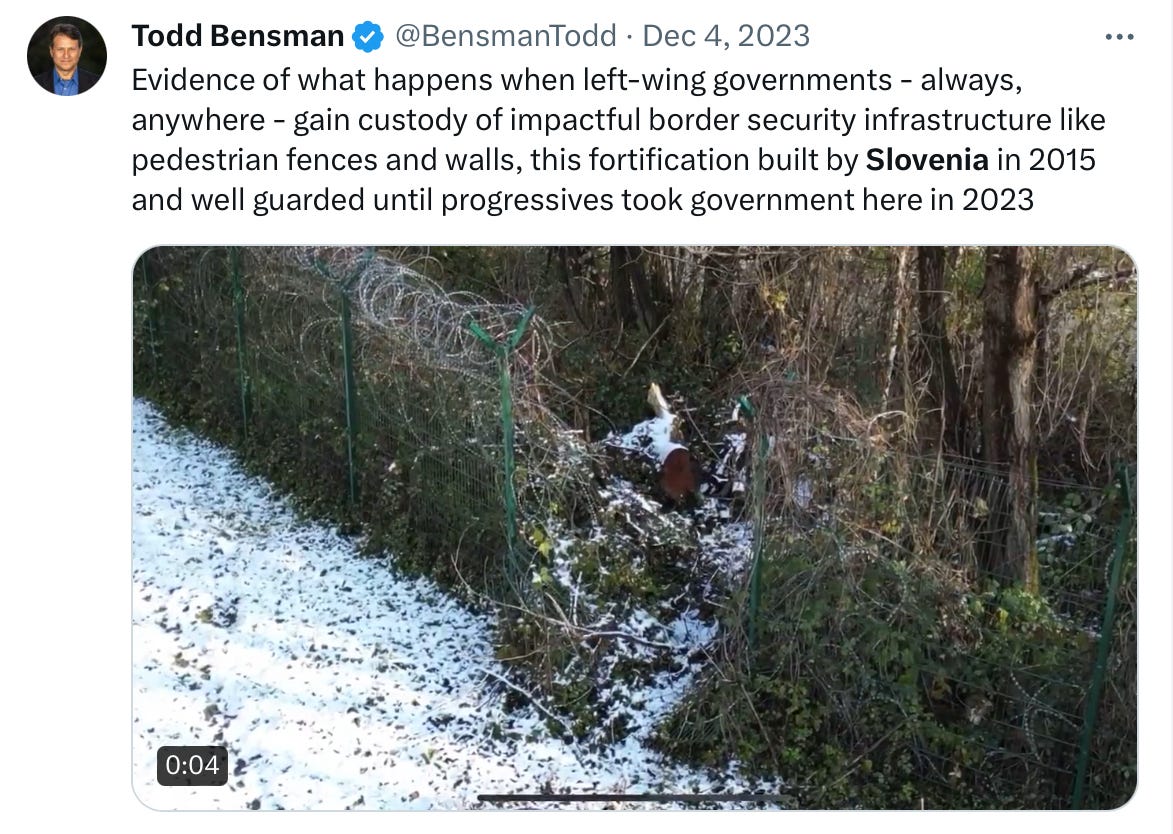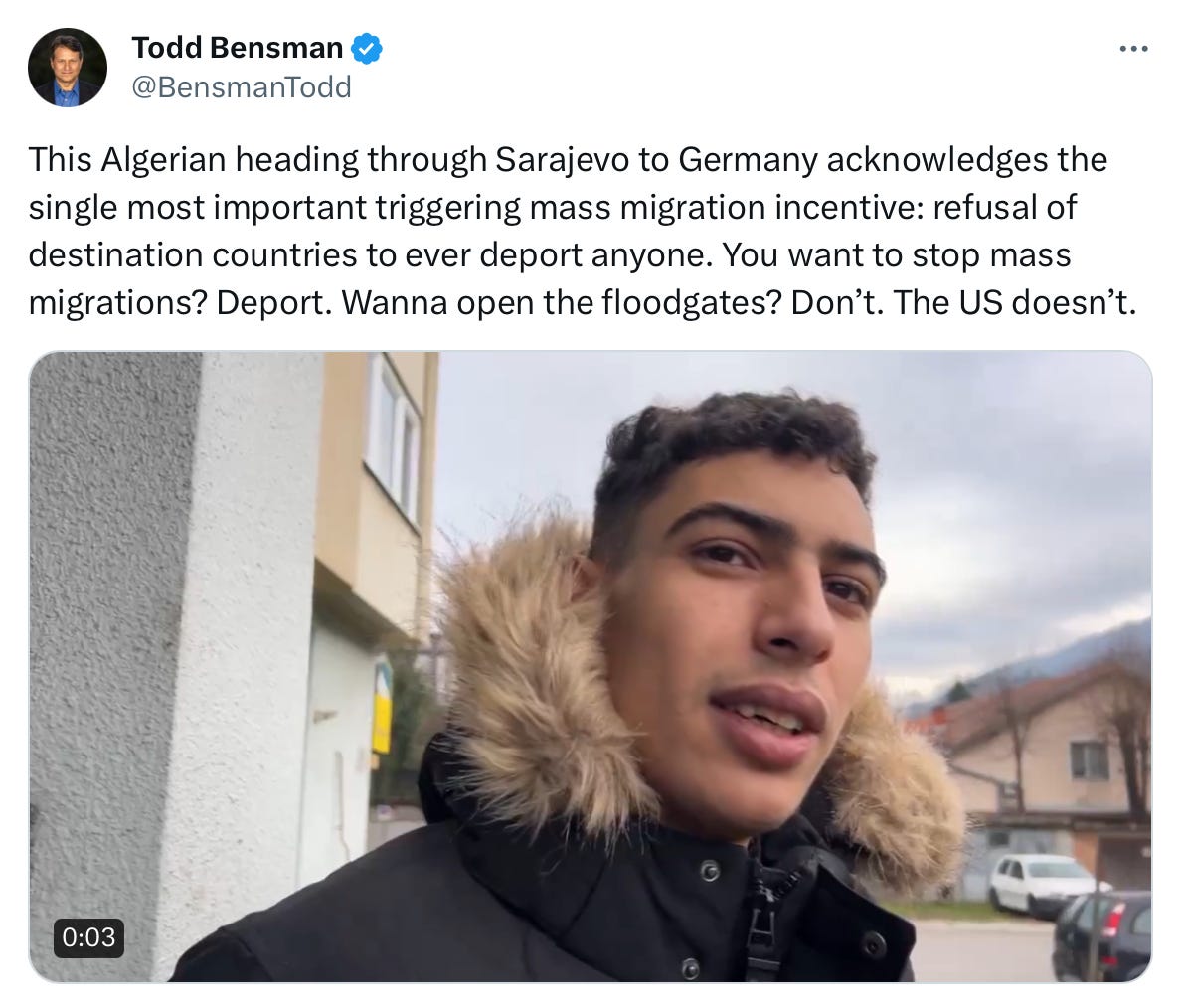From Eagle Pass to Europe, The Truth About Open Borders Has Nothing To Do With The Narrative
Emily Jashinsky interviewed Todd Bensman for The Federalist Radio Hour
“From Eagle Pass to Europe, The Truth About Open Borders Has Nothing To Do With The Narrative”
Emily Jashinsky interviewed Todd Bensman, January 26, 2024.
“We have millions and millions of foreign nationals that have been living and working here, with removal orders on them. It doesn’t mean anything unless you carry them out. So the deal was always meaningless. What the Republicans should have been talking about was 15,000 a day being physically removed, under lawful orders.”
EMILY JASHINSKY (1:08): Joined once again by one of my favorite reporters in the business, Todd Bensman. He’s Senior National Security Fellow over at the Center for Immigration Studies, and author of the extremely timely book, Overrun: How Joe Biden Unleashed The Greatest Border Crisis in U.S. History.
He’s also the author of America’s Covert Border War. […]
(1:35)
You have written a lot recently on Europe — in fact, you were just telling me you spent a month in Europe reporting on some of the migration challenges there. You have a piece in The American Mind, The National Interest, we’ll get to that.
Before we do — because immigration has been probably the hottest story in the media this week, somehow, during a presidential election cycle. The battle over, especially, Eagle Pass, the razor wire, Operation Lone Star went to the Supreme Court, there’s been some complicated legal questions about what the Supreme Court decision actually meant.
Can you just give us, Todd, your reaction to everything that’s transpired this week?
(2:15)
TODD BENSMAN: Yeah. Texas has engaged the federal government in kind of a classic states-rights-versus-federalism battle. It’s a contest we haven’t seen the likes of in many, many decades, to this degree, where Texas is taking into its own hands a federal job — border security and illegal immigration — and trying to stop, block and deter it.
Because Texas is ground zero of this greatest mass migration crisis in U.S. history. More crossover into Texas than any other state, by far. It’s the beginning and the end of the whole thing.
Texas is a blood-red republican state, too. So the governor feels like he has to do something. And the things he has chosen to do are in direct opposition to all of the things the Biden White House wants to do. Which is to assist the entries of as many foreign nationals as it can possibly get in in the shortest amount of time. It’s been going on for three years that way. And it puts these two entities at loggerheads, obviously.
(3:45)
That’s on the ground. They have come close to fisticuffs, down there, Border Patrol agents and National Guard and Texas DPS, they’ve been in terrible nose-to-nose arguments over who gets this group of immigrants, and whether or not the razor wire Texas laid down is in the way of the feds. It’s been going on for many months. Heating up.
But also in the courts, all the way, bouncing out of the Supreme Court. There’s more rulings coming from the Supreme Court — does Texas have the right to stop, block and deter on its own, and to kick out federal agents and block federal agents from the border, which is kind of what they’re doing now.
Texas has seized a 45-acre park in Eagle Pass, called Shelby Park, because that’s ground zero of that sector. Thousands of immigrants trying to cross from Piedras Negras into Eagle Pass. And Texas has fortified that area. It looks like something out of World War I battlefields. Trenches, and barbed wire everywhere, and fencing. It’s really otherworldly in that area.
(5:20)
But the Border Patrol agents represent — to the immigrants — a symbol of: we’re getting in, and being allowed in. So if they find their way past the Texans, to the green uniforms, they get let in, forever, into the country.
They’re literally, the immigrants are using this contest to their own benefit. They’re finding their way to the Border Patrol, Border Patrol is finding their way to them.
It’s like this big lovefest between immigrants and green uniform guys. With Texas kind of blocking the Romeo-Juliet union, there.
And so, they kicked out Border Patrol from Shelby Park. Border Patrol had a processing station, right there, and it was just irresistible to the immigrants who were looking at that from just across the river. And they would swarm in and get themselves to that processing station.
(6:35)
Texas just said, you know, we’re getting rid of the processing station. You’re just causing us too much trouble. And they kicked out all the Border Patrol guys, and said, you can do this five miles downstream, if you want, but you’re not going to do it here.
Now, the feds got permission to go in there and cut all the wire, and shut everything down, for the time being. And now we’re waiting to see whether the feds are going to go in and start cutting wire and tearing it down.
Abbott’s saying, go ahead and tear it all down, as soon as you leave we’re putting it back up. And you’re going to have to come in and tear it back down again. And we’re going to put it back up.
That’s kind of where we are with all this. […]
(8:00)
We have to zoom out, and back, from this fight that I’m just talking about between the feds and Abbott. You know, in just the fall of 2023, the immigrants were just absolutely swarming over the wire. They overwhelmed the Texans. They got to the Border Patrol, and there were so many that the Border Patrol couldn’t process them fast enough in all these places.
That created this big congregation on the river bank that Fox News drones could catch. And it attracted all the media, because the numbers were 14,000 a day, 10,000 a day, 12,000 — numbers that the intelligence community had predicted a year or so ago but nobody really thought it would happen. It did.
(9:00)
Huge numbers coming through. And the optics of that were just terrible for the Biden campaign, which is in full swing now, the political campaign.
All of the polls, universally — it doesn’t matter who’s doing the polls — show that this border crisis is now a number one or two issue, it’s an apex political issue in the negative for the Biden campaign. So, they have to put a stop to those video images that are going out all over the place, and bringing the New York Times.
And, man, even CNN went down there. I don’t think CNN’s ever gone to the border before in these three years. They were there. It was amazing to see them there.
Of course, when they were there, it was like, wow, recently, there’s been a lot of immigrants crossing — you know, just, missing that this has been going on for three years straight, at record numbers.
(10:15)
In the middle of this crazy, Biden goes down to Mexico for a state visit to talk about the migration situation. And he brings [Secretary of State] Antony Blinken. So this is top priority, obviously, for the White House now. They cut a deal. Less than a week later, Mayorkas goes down with Blinken, separately, and they continue the talks. Whatever the horse trading was, we don’t know, because nobody will say.
But what we do know is that Mexico suddenly went medieval on this immigration, on their side of the line. They start bulldozing migrant camps, digging anti-pedestrian trenches, rounding up thousands and thousands of immigrants. And putting them on buses and planes, and flying down to the southern provinces, with Guatemala, and then blocking them in down there and creating a big Gaza Strip type thing.
(11:18)
And, lo and behold, all of this activity dropped the numbers that were crossing from 14,000 a day to 5,000 a day, and 4,000 and 6,000. That’s what we’re seeing now.
The infrastructure can handle moving them off of the border and into the country pretty quickly, so that there’s no more Fox News video of this terrible stuff. And the media went home.
And I think that was the purpose of the diplomacy. To make the media go home and start talking about something else, other than showing these images.
(12:00)
How long Mexico is going to do this is unknown, how long they can do this is unknown. But it shows that when they want to, when they get together, they can shut down sixty percent of this just by having Mexico do some kind of Trumpian stuff. Like they were doing when Trump was in office.
So the numbers are down, right now. We’re getting toward the end of January, and you’re going to see, in a month or so, really low numbers illegally crossing for January. And the Biden administration will take victory laps.
But don’t believe it. They’re still all down there, and on a moment’s notice they can flood back. […]
(13:30)
Down in Tapachula, Mexico, the Mexicans are hauling them all down [south], they’re putting roadblocks everywhere.
The most important thing they did, they shut down La Bestia, the freight train system. Put troops in there to block immigrants from boarding these cargo trains. That was huge, that they did that.
But they are still down there, and the Mexicans are requiring that they apply for this permit, that takes five or six months.
There will be unrest. There always is, when the Mexicans try to do this. The pressure will build to the point where they have to let them go.
The big question is just, what did Mexico get? Did they get the stick, or did they get a check? If they got a check, then once the check cashes, they suddenly get less interested in doing the bidding of the Biden administration on this.
If it’s the stick, or the threat of a stick, that’s a whole other story. That’s how Trump did things, and it was always very effective because that stick could come down at any time, right on their heads.
(14:49)
It’s usually the form of progressive trade tariffs. We just don’t know, nobody’s talking. Those diplomatic missions are continuing. Just last week the Mexicans had their highest level diplomats in Washington meeting with all of our highest level people. This is all still very much going on. […]
EJ (17:12): There was the shutdown of, apparently, bipartisan immigration conversations that were happening among centrist Republicans and Democrats. And Mitch McConnell’s side, clearly, started leaking to the press that this was because Donald Trump didn’t want to give Joe Biden a win during an election year. That was the contention.
In fact, it looks like the real argument — from Trump and from Freedom Caucus types — that this was just a really bad bill. […]
Todd, what did you make of that bill, that we were told was so close, just crumbling this week?
BENSMAN (18:20): Well, for one thing, I was looking for signs of the enforcement part of the deal. And I never could see any. I saw that they would let 5,000 a day in, and then anybody past 5,000 would be put in removal proceedings. But the way the Biden administration does removal proceedings is that they put people in removal proceedings and never remove them. It’s a trick. A feint. There is no enforcement.
And if you’re not doing detention and deportation — actual physical deportations — then you’ve got nothing. You just have thin air. You have nothing at all.
So, I never thought they had anything at all. When they talk about “we’re going to deport people,” they don’t really mean that. They mean they’re going to put them in a paper process, but they’re still going to be running around.
We have millions and millions of foreign nationals that have been running around the country, living and working here, with removal orders on them. It doesn’t mean anything unless you carry them out. So the deal was always meaningless.
What the Republicans should have been talking about was 15,000 a day being physically removed, under lawful orders. And you never heard a word about how many are going to be removed. And so it’s just useless, the whole thing, from the beginning. And I think what put the nail in the coffin is that Trump just got involved and said, this is terrible, don’t do it. And once he got involved, it was over. […]
EJ (20:35): I think the DC beltway media was running with a narrative […]. Todd this is literally your whole book, Overrun. Donald Trump doesn’t need this bill to get shut down to have plenty to run on, when it comes to the border, under Joe Biden. The amount of fentanyl deaths, the number of people from the terrorist watch list who have been caught, the known gotaways — which could include plenty of people from the terrorist watch list. And just the sheer number of people who have even been granted parole under Joe Biden. It’s stunning. There’s no lack of crazy Biden administration policies, dangerous policies, for Republicans to run on in 2024.
BENSMAN (21:25): Exactly. The campaign video is already there, for the advertisements, for the whole year. They’ve got plenty. The Biden campaign understands that current video is still exacerbating. I think they just really care, in terms of a main outcome, that there are no big clumps of foreign nationals on the riverbank to video. That’s it.
The Republicans were about to help them out with that by giving money for more Border Patrol agents and more personnel to go down there, because they think that that means they’re going to block and stop and deter and deport.
But those extra personnel were going to go down there and help move them out of the zone faster, and into the country, faster. That’s all that does. And that’s what the administration is all about, just getting rid of those clumps, those conglomerations of humanity down there.
(22:50)
So, listen, without deportation, without detention, you have an administration that is allowing in 90-plus percent of everybody who shows up at that border. That’s just unprecedented. No country that has ever existed does that. Nobody does that on purpose.
Yeah, there are times that they get around you, but it’s against your will, and against your best efforts, that they got around you.
In this case, we let in almost everybody who reaches the border, and the whole world knows it, and that’s why they’re coming.
This is just an unprecedented thing.
And it’s just belt-fed .50-caliber bullets in the campaign machine gun for Donald Trump. All of that stuff.
EJ (23:46): I was glued to my screen reading some of your recent reporting from Eastern Europe. There are some similarities in the process that are playing out there, that are playing out at our border that we can definitely learn from.
Let’s start with the piece you wrote about Poland for the National Interest. Todd, I had no idea what the situation was like, in terms of migration in Poland. Can you walk us through a little bit of what you saw there and what you came away with?
BENSMAN (24:20): Poland is pretty well known, now, among policy people, for having this hundred-plus mile long fence against Belarus. They put this thing up, and they blocked a lot of the mass migration that was attempting to come through there.
Two years ago, Russia and Belarus purposely sent thousands of Afghan migrants across the Polish border to create a big wave that would disrupt and cause political chaos.
The Polish government, which was a conservative, right-wing government, fought back and they blocked most of it with water cannons, tear gas and billy clubs. It was nasty, two years ago.
And they shut it down and built this wall-fence, and militarized the whole zone for 120 miles.
And they have had very, very little action on that border since.
The piece that I wrote about Poland, there, points out that Poland in October elected a liberal government that is immigrant-friendly and fence-hostile.
And at the very same time, Belarus and Russia — who are mad at Poland and the EU for supporting Ukraine right now and would love nothing more than to weaponize migrants again and send them into the EU through Poland, right over their fence, through it, under it, cut it, whatever — have opened new air routes from the pool of migrants, down in Turkey, to Minsk. Which is the capital, there, about 40 miles from the Polish border, in Belarus. And they’re flying them in there.
(26:25)
We haven’t heard yet whether the new prime minister is going to do the one thing that will trigger it all off, which is to eliminate Poland’s push-back policies. Which is the thing that has kept Poland’s border calm for the last two years.
When an immigrant cuts the fence or climbs over it and gets caught, the Polish throw them back over pretty quickly, or fly them home. Or move them out.
That’s very, very important. That dynamic is the very dynamic that we see at the southern border, where we let everybody in to pursue their asylum claims. And so everybody comes. If you let them in, they come.
But if you push them back, they stop coming.
(27:22)
So Donald Tusk is talking — all during his campaign — that he’s going to end those push-back policies in Poland. Belarus has clearly heard this, because they have reopened this air route. And now it just remains to be seen whether Tusk is going to actually start letting them stay.
And if he does let them stay, you can forget that fence. They’re going to be pouring over that fence, under it, tunneling, cutting through it, everything else. You’ll see a new route open through Poland into the EU.
They’re all headed to Germany. None of them really want to stay in Poland, they want to go into Germany, which is wealthy and gives them all kinds of free stuff.
So that’s the situation in Poland, a snapshot in time at the moment of political transition from a conservative government to another liberal government in the EU, with some really hostile neighbors that have already, in the past, weaponized mass migration.
I’m going to guess they’re gonna make an attempt, and if Tusk lets them in instead of pushing them back, it’s going to open up a huge hole there. […]
EJ: You wrote this other piece, called The Road From Damascus, in The American Mind, which I was just absolutely glued to my screen reading.
BENSMAN: Thanks.
EJ: So good. And also, the first-person in it, where you are [observing] what you’re seeing as human trafficking, trying to tape it, and just getting resistance, to say it lightly.
I bring that piece up, right now, just to help listeners who haven’t read these pieces yet have the context: Who are these migrants? Where are they coming from? Why are they crossing through Belarus and Poland? Why are they crossing through places in Eastern Europe?
What does that broad pattern look like right now?
BENSMAN (30:44): The context for these pieces is the 2015-2016 migrant crisis in Europe, which saw about three million, mostly Middle Easterners, Afghans, Syrians and Iraqis pouring into Germany and France. Everybody remembers this, it was international news for months on end.
And a great many of them were Syrians. And the Syrians, and Afghans and a bunch of others, just went on a bloody rampage of terrorism from one end of the continent to the other. I wrote a major research paper on the number of attacks carried out by border-crossing infiltrators from Syria, and from all these other countries.
And the Europeans reacted against that and put measures in place to shut down the flow, or to slow it, to lower the numbers. […]
(31:56)
A lot of it had to do with fencing that was put up by Hungary and Slovenia and Austria. Also in Macedonia and a few other places along that Balkan Route. Which is where all the terrorists came through from Turkey and Syria.
That shut down some of the terrorism. But the piece you’re referring to now points out that the Balkans Route is now open again. From different factors and different circumstances, it’s wide open. The numbers that are pouring through are now exceeding what we saw in 2016.
So there is a mass migration crisis, a new one, underway in Europe.
And that piece that you’re referring to is about how Syrians, once again, are the top nationality. And that they are young unmarried men, by and large, that are pouring through the Balkan Route into Western Europe once again.
(33:08)
My piece just points this out. It establishes that the Syrians are back, and to remind readers — Europeans, Americans, anyone who cares — about what happened, in terrorism, the last time Syrian men were able to make their way through the Balkans and into Western Europe.
It was ugly. Hundreds, and thousands, of Europeans murdered and injured by these border infiltrations. A lot of them are Afghans, a lot of them are Tunisians.
Most of them are Muslim men crossing through and making their way into Germany, France, and the Netherlands, and some are going to England.
(33:57)
And I’m just predicting that there’s going to be terrorism trouble.
For that piece I interviewed a former intelligence officer in Macedonia, in Serbia, who worked in collaborative settings in Brussels during the 2015-2016 terror attacks, and after, during that mass migration crisis.
And he told me that this very admirable collaborative, intelligence sharing and law enforcement infrastructure that was built during that time is now collapsing and falling apart under liberal governments that keep coming in, and then out, and then in, and then out, in different European Union countries.
(34:54)
And that Europe is not prepared, anymore, and that nobody even remembers what happened.
So, I’m hoping that that piece serves as a reminder to everybody — in the U.S. and in Europe — that immigrants from those places can be very dangerous, and are a national security threat. There’s past evidence of it, a long, bloody track record of it.
EJ (35:25): One of the reasons I was so intrigued by your dispatches from Poland, from Eastern Europe in general, is that it reminded me a lot of what you’ve written, actually, on Central America, South America, Darien Gap, up into Mexico, about these very specific routes.
And it also reminded me that Davos was happening. And it reminded me as well that you had just reported in the New York Post about the United Nations’ contributions to making some of these superhighways, these paths, from different places in the world, possible.
They make those paths possible by offering aid — you can explain this better than I can. That’s distributed by NGOs, supported by U.S. taxpayers. If we zoom out to the global level, Todd, it does seem like […] this is a broader goal, this is part of a bigger open borders conversation, or agenda, really.
That sounds conspiratorial and ridiculous, but the proof is right there. It’s happening in real time, is it not?
BENSMAN (36:40): It is. The piece you’re referring to is about how the United Nations plans to spend 1.6 billion dollars aiding and abetting the mass illegal immigration to our border through Latin America.
They publish a budget for this, and what they’re going to use the money for in Latin America. You can find it, I’ve linked to it.
It’s hiding in plain sight, this budget document, about what the UN is up to.
They lay it out in 130 pages of text and charts that even I can understand. Anybody can understand this.
EJ (37:25): They also have a new interactive tool. […] I was looking at some of the Christian groups […] this vast network of NGOs, some of which, you would think, would know better.
BENSMAN: Two hundred and forty eight NGOs are going to help them pass this cash around. Ultimately, what it looks like from the 30,000-foot level, is that no immigrant heading to the U.S. border is going to ever go without. They don’t have to worry about food, shelter, clothing, transportation, money. They will never go without support for all their basic needs — from their home countries all the way to our border.
That’s the big takeaway, here. The United Nations is leading this effort, $1.6 billion for just 2024. It was hundreds of millions of dollars last year, hundreds of millions the year before. All together it’s just billions of dollars that are going to aid and assist the transportation and shelter of hundreds of thousands — millions — of immigrants on their way to our border.
There are some people who take great exception to that idea. That U.S. taxpayer-funded UN agencies, like the IOM, and UNHCR, and 13 other ones — that are substantially funded by the U.S. treasury — are sending millions of people over our border and creating a crisis for the United States. On ideological grounds.
(39:21)
But the facts and figures are there. I wrote about this, I wanted to draw attention to this document. I’ll probably have more coming on this. […]
Two hundred and forty eight NGOs are working down there at way stations handing out, in 2024, they’ll hand out $370 million worth of cash. Debit cards, and multi-purpose cash, in envelopes.
Sometimes they don’t give debit cards, they just give cash and put it in an envelope and hand it out. This is according to their documents.
They will spend tens of millions of dollars on what they call “humanitarian transportation.” That’s smuggling. They’re paying for bus rides and taxi cabs and mini busses across borders.
And in the document you can read where they are winning, about the illegality of this travel, and they don’t care. They know it’s illegal and they don’t care. They say it. They say it over and over again.
We understand that situations are irregular. And that they will be crossing borders without authorization. And without documents. But we’re going to give them all the stuff they need to do it anyway.
(41:00)
That’s kind of the gist of what the UN is doing in our southern hemisphere.
They’re also involved in the very same activity all over the Balkans where I just came from. I toured their camps, I interviewed their people. They don’t care about ideology of the people, even radical ideologies. They don’t ask, they don’t tell, anything about these people coming through. They just support them.
And they are very well aware that most, if not all, of the immigrants that they’re serving, in Europe, at these way stations, are about to cross someone’s country illegally. And keep going. And they feel like that’s just their human right.
EJ (42:05): Correct me if I’m wrong — you were reporting from Bosnia back in the ‘90s, weren’t you? So, you’re back there now in just a completely different context, in Eastern Europe, but still so much instability.
BENSMAN (42:22): It’s true, in my salad days, as a young journalist, I did cover the wars in Bosnia. During the siege of Sarajevo. This was my first time back in 30 years — I’m totally aging myself.
These countries are pretty vulnerable to this kind of mass migration. Because their institutions and their police forces and their militaries — and their political will. They just don’t have the political will to stop and of this. They prefer to not do anything or spend any money, as long as they’re moving through to the next country.
And in this case they’re pouring into Slovenia which had a fence, an effective border fence that stopped a lot of this in the past.
(43:30)
But now they have a new liberal government that’s — guess what? — humanitarian minded when it comes to immigrants. And so they’re just pouring into Slovenia, claiming asylum, and being released.
Well, when you catch and release people, they tend to send word downstream that, hey, it’s open over here, and everybody goes. It’s the thing that creates greater momentum, and crowds and volume. That’s what happened with Slovenia.
I toured the Slovenia fence, on my own, just kind of wandering around it. Sections of it are torn down. And there’s nobody guarding it. You can go back and forth between Croatia and Slovenia at will.
Driving, walking, whatever — nobody cares. It’s just sort of an in-the-way structure now.
That’s where everybody’s heading. All of the immigrants I met in Bosnia were on their way to Slovenia, through Croatia.
So, that’s what happens when you have liberal governments. Poland, we’re going to see what happens there. Slovenia, et cetera.
And they catch and release. Catch and release is the green light, it’s the trigger-pull for mass migration here, in the U.S., and there in Mexico. The dynamic is exactly the same.
I interviewed one Algerian who spoke great English — that’s why I really zeroed in on that poor guy. If you find an Algerian who speaks English, you better take advantage of that.
He’d been stuck in Greece for 6 or 7 years. I said, why are you going now?
He said, well, two reasons. One is, this new way opened. Number two is, they aren’t deporting anybody in Europe. It’s 90 percent of the issue. If they were deporting us, I wouldn’t go. But they don’t deport anybody. So, if I keep my nose clean, I can live there forever, they’ll never deport me.
And then he took off.
EJ (45:57): That sounds familiar.
BENSMAN: Yeah. It’s the same dynamic here. We don’t deport anybody. We have this negotiation in the senate, nobody was talking about how many we’re going to deport. And so, it’s meaningless without deportation. […]
Follow Todd Bensman’s work at ToddBensman.com and CIS.org. On X, @BensmanTodd.
-30-



